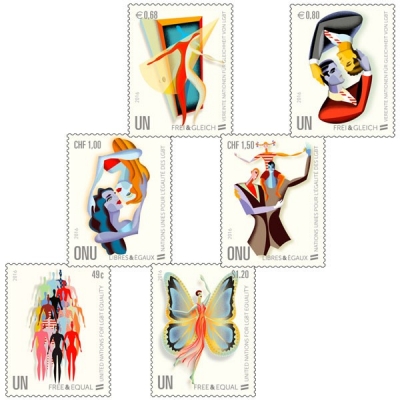The UN produces postage stamps to send mail from its offices in New York City, Geneva and Vienna. In practice, though, most UN offices use metred mail, while its stamps are more commonly sought by tourists or collectors.
“Each year, the United Nations would send me their annual collection and I would mount them in an album. I began collecting in1951,” Cohene recalls. “Four years ago I read in their bulletin that they were looking for a sales representative in the Pacific Northwest. I figured I’m retiring and it would be a good gig.”
Cohene completed the application and was told there were several people vying for the position. He was invited down to California, where an upcoming, large-scale national philatelic show was scheduled. It was an opportunity to meet the chief of the United Nations Postal Administration.
“I met him and we had good chemistry. He had several people to interview. Our meeting was very casual,” Cohene recalls.
“He liked what I had to say and said, ‘I’ll get back to you.’ Two weeks later, he called and said, ‘I just have one question for you.’ I asked, ‘What’s that?’ ‘Why should I hire you?’”
Cohene told the philatelic chief that the answer was simple. “Not only do I live in the Pacific Northwest, but I know you don’t have a representative in Canada and, living in Vancouver, I could cover Canada,” he recounts.
“They have shows in Montreal and in Toronto. I said, ‘I’m from Montreal and I speak French.’”
The pitch worked, and Cohene was hired.
As the sales rep, he runs booths and sells the UN’s newly issued stamps on commission. Beginning in 2012, each year Cohene attends five or six shows national stamp shows throughout his region, including in Ottawa, Montreal, Portland, Ore., and Sacramento, Calif.
“The United Nations produces postage stamps the same way the Vatican does, the same way Canada or any country does. The stamps are designed for collectors,” he explains.
The UN often issues stamps in a series. “They don’t recognize individuals that much, like Canada would introduce a stamp recognizing the queen or a prime minister,” Cohene says. “They recognize global issues,” such as climate change or endangered species.
The stamps produced by the UN may commemorate historical events or honour communities, such as the recent release of stamps paying tribute to the LGBTQ community.


 Mike Cohene at Seattle Philatelic Exhibition in 2015
Mike Cohene at Seattle Philatelic Exhibition in 2015
 Among the series of stamps that the UN produced was a set honouring the LGBTQ community.
Among the series of stamps that the UN produced was a set honouring the LGBTQ community.